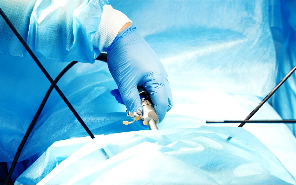
- Home >
- Surgical Negligence Claims
When unreasonable mistakes during surgery lead to avoidable injuries, the consequences can be vast and even life-threatening. If you or someone you love was affected this way, we can fight for your right to justice.
With over 30 years of experience and millions recovered for those hurt by surgical errors, trust our specialist surgical negligence claims solicitors to support you at every step of your claim. Get the compensation and answers you need to take back control of your life.
Our surgical negligence claims services


Do you have a surgical negligence claim?
Every surgery carries risk. But when actions are taken that no reasonable surgeon would repeat, this can lead to anything from longer stays in hospital and ongoing health problems, to life-changing disabilities and sadly even death.
Whether your surgery was delayed or you suffered avoidable injuries, our trusted solicitors can guide you to a successful surgical negligence claim. Ensure that your injuries are recognised, your questions are answered, and you secure the compensation to preserve your quality of life.

The specialist surgical negligence claims solicitors for Essex & East Anglia
Since 1993, our surgical negligence solicitors have helped countless claimants prove their cases and achieve the right settlements.
We understand the immense toll these injuries can have on you and your loved ones. We help you turn the page on this difficult chapter, investigating all evidence and working tirelessly to build a winning case. Acting on a ‘no win, no fee’ basis and settling 96% of our cases out of court, we strive to make your pursuit of justice as stress and risk-free as possible.
How much could your surgical negligence claim be worth?
What does our surgical negligence claims process look like?

A free initial consultation
Call us, request a callback or complete our online form and we’ll assess if you have a valid medical negligence claim.

Funding your claim
Discover the ways we can fund your claim without you paying a penny at any stage of the process.

Investigating evidence
We gather medical records, witness statements and more to learn what happened to you and prove your claim.

Instructing independent medical experts
We work with impartial, experienced medical experts to establish whether your injuries were due to substandard medical care.

Valuing your claim
We assess your health and financial losses to accurately estimate how much compensation your claim is worth.

Presenting your case
We contact the Defendants and the Courts on your behalf to set out your allegations and receive a response.

Negotiating a settlement
We work to achieve a fair settlement for you outside the courtroom – this is how 96% of our cases end.

Preparing for Trial
If we must proceed to Trial, we fully prepare you for what to expect so you receive the right result in court.
FAQs about surgical negligence claims
What is a surgical complication?
All surgeries carry risk. However, there are occasions when a patient suffers an injury that could have been avoided if the procedure had been performed to the required standard.
The injury may be due to delayed surgery, wrong site surgery, or the actions or inaction of a surgeon, anaesthetist, or another healthcare professional involved in a surgical procedure. If a surgeon’s technique is substandard, or they make a mistake that causes an injury, their patient can suffer.
A patient may require further surgery to repair the damage caused by surgical complications, or be left to manage ongoing health problems or disabilities. In extreme cases, surgical errors can be fatal.
What are the main causes of surgical errors?
Numerous instances can lead to a surgeon or another healthcare professional making an error during an operation:
- A loss of concentration at a crucial moment could result in cutting a nerve or blood vessel
- The surgeon might mistake landmarks and structures, resulting in them performing unnecessary surgery on the wrong part of the body
- The surgeon may fail to double-check that they have performed an action correctly, or assume that it has been performed correctly
- There may be a failure to monitor a patient’s heart rate and breathing
- The anaesthetist may use too much anaesthetic, putting the patient’s health at risk, or too little, which could result in anaesthesia awareness
If these mistakes result in the pain and suffering of the affected patient, they may be entitled to make a surgical negligence claim for compensation.
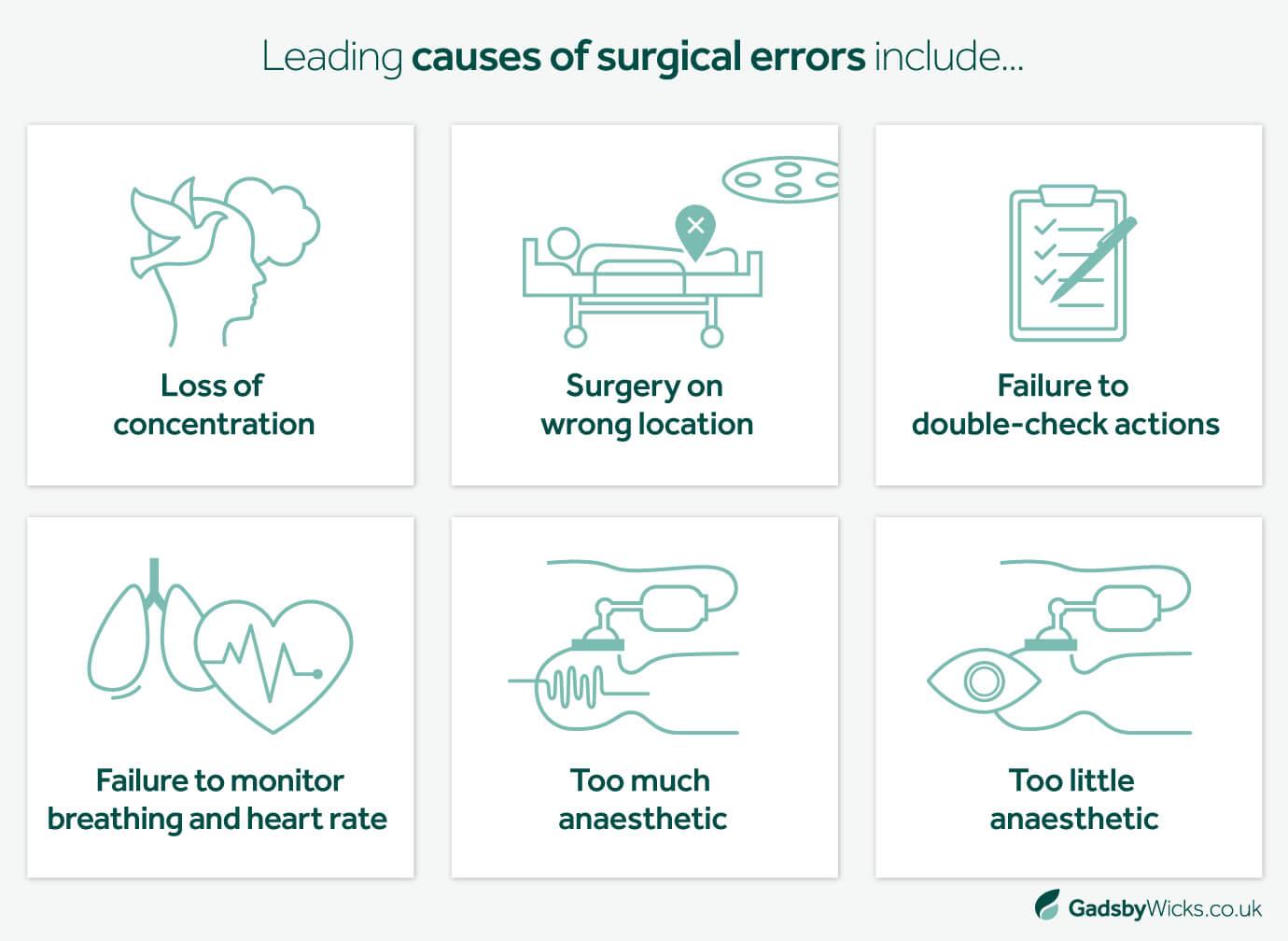
When is medical negligence to blame for surgical complications?
A negligent surgery claim case can arise when a surgeon's error(s) during a procedure is something that no reasonable surgeon in the same position would have made. This must be determined on a case-by-case basis, as several factors may influence if a mistake made during surgery is reasonable.
For instance, in several types of abdominal procedures or weight loss (bariatric) surgeries, a surgeon must perform actions ‘blind’, through touch alone. In these circumstances, it may be considered reasonable if they mistakenly damage a nerve, blood vessel or organ.
However, if the surgeon responsible does not recognise this risk, and the affected area is not monitored post-surgery to check if anything did go wrong, this could lead to a negligence claim should the patient become unwell or suffer further injury.
In another example, if a patient is overweight and undergoing their fourth abdominal surgery, it may be more justifiable if damage is caused to surrounding structures compared to someone undergoing their first abdominal surgery.
As surgical negligence claims solicitors, we engage with impartial surgeons, working in the same field as the Defendants, to determine whether they failed in their duty of care towards their patients.
How do I make a surgical complication claim and what should I expect?
We understand that the claims process can be difficult to navigate, so we are always transparent about what you can expect.
Our expert lawyers are with you every step of the way, and we commit the time and resources necessary to fully investigate your negligent surgery claim. We will examine all available evidence to determine if your medical care was substandard, including:
- Medical records
- Claimant statements
- Witness statements
- Complaint correspondence
- Independent medical opinion
We have a database of independent surgeons with relevant medical and legal knowledge to help us determine whether your surgeon’s actions were unreasonable and directly responsible for your pain, suffering or loss.
We will also speak to relevant medical experts to establish how much your situation has changed compared to if your surgery was performed correctly. This will play a key role in quantifying the compensation you deserve.
We can provide this help under a ‘no win, no fee‘ agreement – you only pay if we win your case. Our payment is recovered from the settlement you receive, and we never ask you to pay anything at any stage of the claims process.
What can a compensation claim help with?
The scope of potential outcomes following a surgical complication is vast. At its most minor, a mistake could result in a longer stay in hospital, a need for stronger painkillers, more prominent scarring or additional procedures.
However, the consequences of a surgical error can be significant or permanent and life-altering. A patient may be left paralysed as a result of nerve damage inflicted during surgery, or becoming very unwell due to ongoing internal bleeding that is not addressed post-surgery. They may need to make dramatic changes to their lifestyle, home, work and social life, or require frequent therapies or treatments to support their quality of life.
An example of the repercussions of surgical complications is the case of Mr F. Following a knee arthroscopy to investigate knee pain, Mr F felt tightness and pain, and blood ran down his leg when he stood up.
He was discharged after a tighter bandage was applied, but several days later his leg had become increasingly painful, hot and swollen. On examination at A&E, the leg was found to be purple and investigations revealed an arterio-venous fistula and a DVT in the posterior tibial and peroneal veins.
Following treatment, Mr F now has to take Warfarin for life and he is left with restricted movement in the knee. Moreover, as a self-employed builder and kitchen fitter, he suffered substantial financial losses.
Mr F’s claim was settled before trial for a total of £130,000. The compensation awarded following a successful surgical complication claim can cover a wide variety of costs, including (but not limited to):
- Future procedures
- Annual check-ups and scans
- Ongoing therapies
- Home and vehicle adaptations
- Mobility equipment
- Long-term care requirements
- Loss of income
- Travel expenses
In the unfortunate event that a patient dies as a result of negligence during surgery, those who depended on the deceased financially, or benefited from services they provided for free, may be entitled to claim compensation.
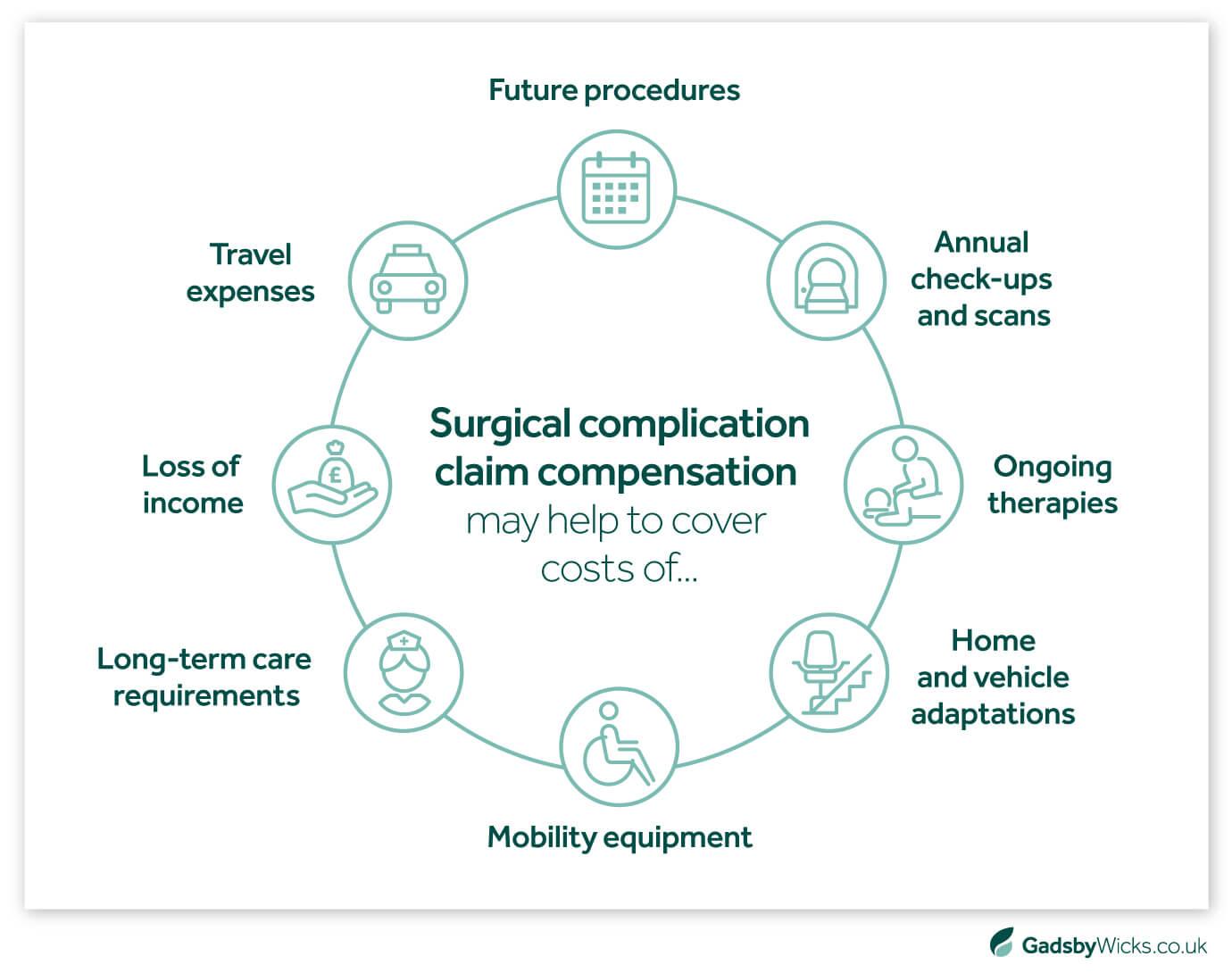
How long do surgical complication claims take to settle?
In most cases, we expect a surgical negligence claim to take between two and five years to reach a final settlement. This is dependent on the stance taken by the Defendants, and how long it takes for medical experts to establish an accurate prognosis.
During the wait to settle, if the Defendants have admitted liability or there is a high likelihood that the Defendants will be found liable, a claimant can potentially apply for interim payments.
Contact our expert surgical negligence claims solicitors
If you or a loved one suffered a surgical injury and would like to speak to someone about your options, our team is here to listen and advise you on your next steps.
Featured surgical negligence claims insights


Recognising the impact of spinal cord injury complications

Exploring the effects of anaesthesia awareness

Lexcel accredited medical negligence claims solicitors
We are proud to be a Lexcel-accredited practice. The accreditation is a mark of quality and comes directly from the Law Society.
A recent assessment described us as a “Centre of Excellence” and we continue to operate to the highest standards across all main areas of our field. These include client care, case management, financial management, structure and strategy, people management, risk management, information management and file management.
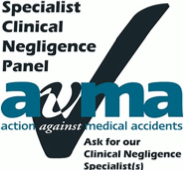

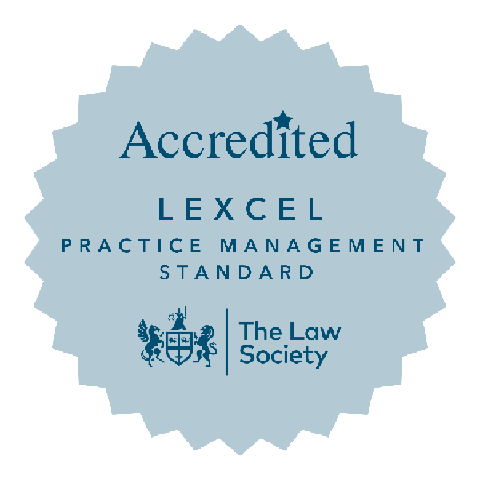

Industry Recognised



